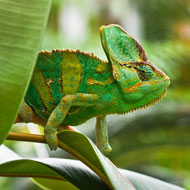
Scientists debate ethical issues of keeping reptiles and amphibians
A team of international scientists has argued that keeping pet reptiles and amphibians does not place a ‘disproportionate burden’ on public health or animal welfare, compared to that of keeping other companion animals.
Their review, published in the Veterinary Record, calls for the responsible and sustainable keeping of these animals as pets, and makes a number of recommendations for improving their welfare.
However, a viewpoint article by five veterinary surgeons and the biologist Clifford Warwick - also published in Vet Record - criticised the review, accusing the authors of seeking to ‘water down decades of objective science’.
Keeping exotic pets is currently under debate and the governments of several countries are exploring the regulation, or even banning, of exotic pet keeping. Major concerns outlined in the review by F Pasmans et al, include public health and safety issues, animal welfare and biodiversity conservation. Exotic pets (defined by review authors as all pets excluding dogs, cats and horses) are thought to make up 34-64 per cent of the pet population.
Writing in Vet Record, scientists said: ‘Despite the wide availability of specialist information, care products and expert advice and veterinary care, inappropriate management and nutrition by inexperienced keepers remains a concern, particularly because of potentially misleading information available online.
‘The authors do not, however, believe that keeping reptiles and amphibians presents a disproportionate burden on public health or animal welfare compared with that posed by the keeping of other companion animals. The authors therefore do not see any valid reasons to selectively restrict the keeping of reptiles and amphibians for these reasons.’
They believe regulatory measures should be based on evidence-based risk assessment criteria, that are free from ‘public perceptions and pressure’. Recommendations made in the report include: developing and maintaining species-specific, minimal husbandry requirements; educating pet keepers; sanitary measures to prevent pathogen pollution; increasing the sustainability of the pet trade by promoting trade in captive-bred animals; closing legal loopholes, and; promoting high standards of veterinary care.
However, Clifford Warwick and others point out that 70 per cent mortality rates at exotics wholesalers are considered ‘industry standard’. In addition, they cited an investigation of 15 European wholesalers, of which 11 were considered prosecutable due to poor animal welfare standards. Not only that, research has shown up to three-quarters of reptiles die during their first year in the home, and at least 30 behavioural signs of stress are regularly observed in captive reptiles. There also remains ‘a dearth of independent, objective, scientific evidence-based data’ on the needs of these animals.
‘We would argue that the small amount published implies that reptilian and amphibian biological needs are so complex and require such advanced scientific understanding that they cannot be met even in the best zoos (let alone private homes),’ they wrote.
Furthermore, they said, reptiles and amphibians are associated with at least 40 zoonoses, most notorious of which is reptile-associated human salmonellosis (RAS). It is suggested there are approximately 74,000 cases of RAS a year in the USA and 6,000 cases annually in the UK.
In conclusion, Clifford Warwick et al said risk-based species restrictions ‘are indeed valuable’, particularly before any commercialisation.
‘The evidence from the highest levels of bioscience demonstrates that mitigating the destructiveness of reptile trading and keeping resides in bans and ‘positive lists’ (PLs) – species impartially determined suitable to be kept by scientific evidence.’



 The veterinary mental health charity Vetlife is inviting the veterinary community to join it for a sponsored cold-water dip.
The veterinary mental health charity Vetlife is inviting the veterinary community to join it for a sponsored cold-water dip.